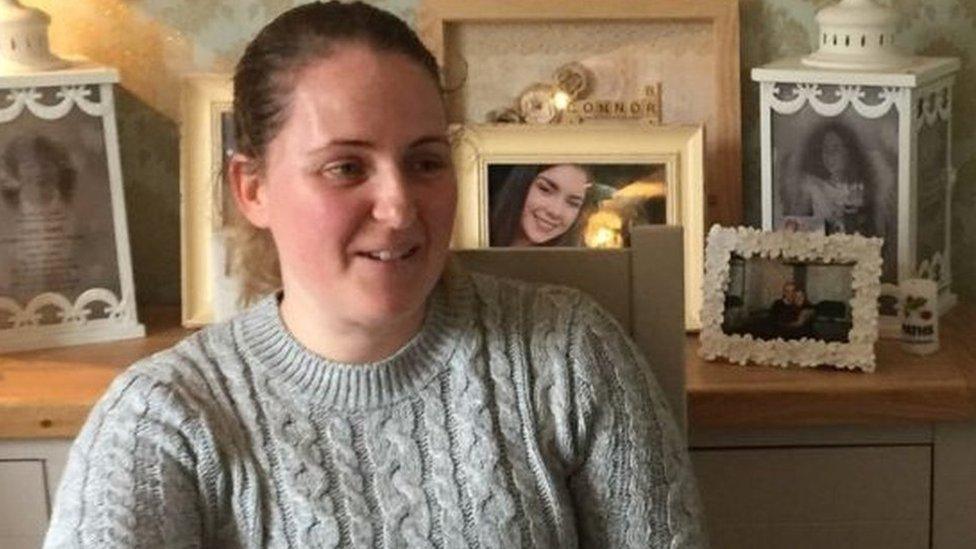Cyber-bullying affects more girls than boys in Northern Ireland
- Published
- comments

Girls in Northern Ireland are more likely than boys to experience cyber-bullying, new research suggests.
The EU-funded Blurred Lives project studied how young people between the ages of 14 and 16 experienced and responded to cyber-bullying.
More than one in five children (22%) in the study said they recently had nasty or unpleasant experiences online.
But most children who took part said they had never experienced or witnessed cyber-bullying.
More than a quarter of girls who took part in the study (27%) said they had recently experienced cyber-bullying compared to 17% of boys.
The findings were based on detailed responses from 525 schoolchildren in Northern Ireland.
Some reported they had been told to kill themselves or cut their wrists.
Others said they been mocked about their appearance or sent nude pictures.
Just over one in 10 (11%) said they had done something nasty or unpleasant online to someone else.
'Own smartphone'
The most common type of cyber-bullying was "mean things" said online.
Other children reported rumours spread about them online, being sent embarrassing text messages or pictures, or people creating fake profiles for them on social media.
Boys were three times more likely than girls not to tell anyone they had been cyber-bullied.
Among children and young people in Northern Ireland
22%Experienced nasty or unpleasant experiences online recently
27%Of girls had experienced cyber-bullying
17%Of boys had experienced cyber-bullying
11%Said they had done something nasty or unpleasant to others
However, the majority of the children did want teachers, parents and their friends to offer support when cyber-bullying was happening.
The research also looked more widely at online use among the participants.
Almost all of the children who took part had their own smartphone, while a majority said they also owned tablets and games consoles.
Adult sites
Over half of those who took part said they spent more than five hours a day online.
Snapchat and Facebook were the most popular sites and apps - used by about two-thirds of the young people who took part in the research.
YouTube and Instagram were used by about half the participants, while only one in 10 used twitter.

Some 2% of respondents admitted they used adult sites.
The Blurred Lives project received 291,000 Euro (£262,000) from the European Union's Erasmus + programme to carry out the research.
Stranmillis University College in Belfast was the lead partner, working in collaboration with universities in England, Italy, Holland and Germany.

One mother's story

Mandy Chism has spoken about her daughter, Elle, who took her own life in 2017
Mandy Chism's 16-year-old daughter, Elle, took her own life in April 2017 after she was targeted by cyber bullies.
The bullying began five years earlier when Elle got a mobile phone and started secondary school.
Mandy, who lives in Omagh, County Tyrone, said she was shocked by the scale of abuse, which happened through an anonymous online platform.
She said the bullies encouraged her daughter to attempt to take her own life.
"There has always been bullying, there will always be bullying, the severity of it blew me away," she said.
"It send shockwaves through our family, it clearly sent shockwaves through Elle, she was very upset and horrified. She did start self-harming."
Mandy said Elle became isolated and "quite erratic" as the bullying affected her "whole mindset".
Harrowing
She added: "It felt like I was in the wild west with things coming at me from every angle and not knowing how I can stop this, how can I sort this out?"
She said it was "harrowing" to discover the culprits could not be traced due to the anonymous nature of the forum they used.
She added that she did not think it was fair to blame the children behind the abuse.
"We have to remember they are 11 or 12-years-old. These app providers allow them to be anonymous," she said.
Mandy said they lost Elle five years after the abuse began. She said her death had not only affected her family, but had had an impact on her school and community.

- Published21 October 2017

- Published23 November 2017
